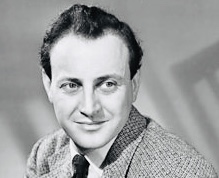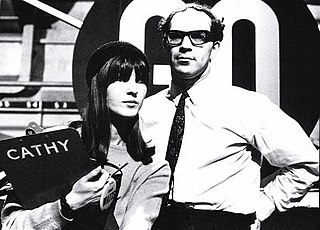Related Research Articles

The BBC Light Programme was a national radio station which broadcast chiefly mainstream light entertainment and light music from 1945 until 1967, when it was replaced by BBC Radio 2 and BBC Radio 1. It opened on 29 July 1945, taking over the long wave frequency which had earlier been used – prior to the outbreak of the Second World War on 1 September 1939 – by the National Programme.
My Music was a radio panel show which premiered on the BBC Home Service on 3 January 1967. It was a companion programme to My Word!, and like that show featured comic writers Denis Norden and Frank Muir. The show was last recorded in November 1993 and broadcast in January 1994, then rebroadcast until 2011. It was also broadcast via the BBC World Service. There was also a television version on BBC2 which ran for seven series between 1977 and 1983.

Anthony Kenneth Blackburn is an English disc jockey, singer and TV presenter. He first achieved fame broadcasting on the pirate stations Radio Caroline and Radio London in the 1960s, before joining the BBC, on the BBC Light Programme. He was the first disc jockey to broadcast on BBC Radio 1 at its launch, on 30 September 1967, and has had several stints working for the corporation. He has also worked for Capital London and Classic Gold Digital, and currently BBC Radio 2, BBC Local Radio, and British Forces Broadcasting Service. He has also had a singing career.
Pick of the Pops is a long-running BBC Radio programme originally based on the Top 20 from the UK Singles Chart and first broadcast on the BBC Light Programme on 4 October 1955. It transferred to BBC Radio 1 from 1967 to 1972. The show was revived for six years in 1989 and its current production run started on BBC Radio 2 in 1997. It is currently hosted by Paul Gambaccini.

David Lewis Jacobs, CBE was a British broadcaster perhaps best known as presenter of the BBC Television 1960s peak-time show Juke Box Jury, and as chairman of the long-running BBC Radio 4 topical forum Any Questions? Earlier radio work included small acting parts: over the years he played himself or presenter characters in film, television and radio productions. Jacobs finally stepped down as a BBC Radio 2 presenter shortly before his death in August 2013, his career having spanned more than 65 years.

Ready Steady Go! was a British rock/pop music television programme broadcast every Friday evening from 9 August 1963 until 23 December 1966. It was conceived by Elkan Allan, head of Rediffusion TV. Allan wanted a light entertainment programme different from the low-brow style of light entertainment transmitted by ATV. The programme was produced without scenery or costumes and with a minimum of choreography and make-up. Allan recruited a fellow journalist, Francis Hitching, as producer. Hitching became a major figure in light entertainment in the 1960s. Robert Fleming was the first director, followed by the documentary director Rollo Gamble, then Michael Lindsay-Hogg, Daphne Shadwell and Peter Croft.
Brian Matthew was an English broadcaster who worked for the BBC for 63 years from 1954 until 2017. He was the host of Saturday Club, among other programmes, and began presenting Sounds of the 60s in March 1990, often employing the same vocabulary and the same measured delivery he had used in previous decades.
Friday Night is Music Night is a long-running live BBC radio concert programme featuring the BBC Concert Orchestra, broadcast on the BBC Light Programme and its successor BBC Radio 2 since 1953. The programme is the world's longest-running live orchestral music radio programme.
Music While You Work was a daytime radio programme of continuous live popular music broadcast in the United Kingdom twice daily on workdays from 23 June 1940 until 29 September 1967 by the BBC. Initially, the morning edition was generally broadcast on the BBC Home Service at 10:30am, with the afternoon edition at 3pm on the Forces/General Forces Programme - and after the war on the BBC Light Programme. Between August 1942 and July 1945, a third edition was broadcast at 10:30pm for night-shift workers.
The Beeb's Lost Beatles Tapes was a music documentary series presented by Richard Skinner, comprising 14 half-hour episodes, broadcast on BBC Radio 1 between 1 October – 31 December 1988. Each episode was broadcast on Saturday evening with a repeat on the following Monday.
Sounds of the 60s is a long-running Saturday morning programme on BBC Radio 2 that features recordings of popular music made in the 1960s. It was first broadcast on 12 February 1983 and introduced by Keith Fordyce, who had been the first presenter of the TV show Ready Steady Go! in 1963. From March 1990 until February 2017, the presenter was Brian Matthew. Tony Blackburn has hosted the show since 4 March 2017.
Sounds of the 70s is the name of BBC radio programme, currently broadcast on Sundays by BBC Radio 2, with the Sounds of the Seventies name also having been used by BBC Television for a number of themed music compilations, now repeated on BBC Four.
The Beatles Anthology is a documentary television series on the career of the Beatles. It was broadcast on UK television in eight parts on ITV between 26 November and 31 December 1995, while in the United States it was seen as three feature-length episodes on ABC between 19 and 23 November 1995. It was released in greatly expanded form as an eight-volume VHS set and an eight-disc Laserdisc set on 5 September 1996. The series was re-released on DVD in 2003, with an 81-minute special-features disc.
Saturday Club was an influential BBC Radio programme in the United Kingdom, broadcast on the BBC Light Programme and later BBC Radio 1 between 1957 and 1969. It was one of the earliest – and for several years almost the only – radio programme in the country to broadcast pop music. Its longest-serving and best remembered host was Brian Matthew.
Melodies for You was a long-running BBC radio music programme, broadcast on Sunday mornings until 1992 and Sunday evenings subsequently, which presented works of light popular and classical music.

BBC Radio 2 is a British national radio station owned and operated by the BBC. It is the most popular station in the United Kingdom with over 15 million weekly listeners. Since launching in 1967, the station broadcasts a wide range of content. The Radio 2 about page says: "With a repertoire covering more than 40 years, Radio 2 plays the widest selection of music on the radio—from classic and mainstream pop to a specialist portfolio including classical, country, folk, jazz, soul, rock 'n' roll, gospel and blues."
This is a list of events from British radio in 1965.
The Sunday Hour was a long-standing show broadcast on the BBC Light Programme and then BBC Radio 2 in the United Kingdom, broadcast for 78 years between 14 July 1940 and 28 January 2018.
A timeline of notable events relating to BBC Radio 2, a British national radio station which began broadcasting in September 1967.

Frances Mary Line OBE, whose married name was Frances Lloyd, was a British radio executive. From 1990 to 1996, she was Controller of BBC Radio 2, the first woman to hold the post and only the third to run a BBC Radio network after Clare Lawson Dick and Monica Sims, Controllers of Radio 4 from 1975–76 and 1978–83 respectively. Line had previously worked at the BBC as a clerk-typist, secretary, producer's assistant on BBC Television, and producer and then Head of Music on Radio 2.
References
- ↑ "BBC Genome Project". Easy Beat. Retrieved 18 February 2018.
- ↑ Bill Harry, Mersey Beat, Brian Matthew
- ↑ Radio Rewind: Light Programme Music